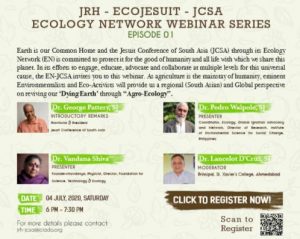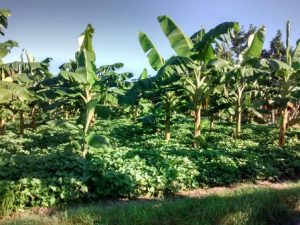Greed of Agribusiness is Ruining Our Common Home: Say Agroecologists
Instead of being prey to the business of industrial agriculture, we need to be collectively responsible for the rights and care of the farmers.
 Global pandemic COVID-19 has made humans recognise their inter-relatedness and interdependence at the cost of millions of lives and price of thousands of migrant labourers’ livelihood. It is ironic that we the humans seem to recognise our inter-relatedness and interdependence so intensely and globally mainly through the pandemic of COVID-19. Considering agriculture as the mainstay of humanity, eminent environmentalists and eco-activists shared their perspectives on reviving the dying Earth through “agroecology”, at the webinar “Protecting Earth-Our Common Home: Reviving Agroecology”. While speaking at the webinar, Dr Vandana Shiva, Founder of Navdanya, and the Research Foundation for Science, Technology, and Natural Resource Policy (RFSTN), shared that there is an urgent necessity for using our hands, heads and hearts to protect the farmers who grow the Holy Sacrament of Food. The webinar was conducted by the Jesuit Resource and Response Hub (JRH) in collaboration with the Eco Jesuit Network of the Conference of South Asia on 4 July 2020.
Global pandemic COVID-19 has made humans recognise their inter-relatedness and interdependence at the cost of millions of lives and price of thousands of migrant labourers’ livelihood. It is ironic that we the humans seem to recognise our inter-relatedness and interdependence so intensely and globally mainly through the pandemic of COVID-19. Considering agriculture as the mainstay of humanity, eminent environmentalists and eco-activists shared their perspectives on reviving the dying Earth through “agroecology”, at the webinar “Protecting Earth-Our Common Home: Reviving Agroecology”. While speaking at the webinar, Dr Vandana Shiva, Founder of Navdanya, and the Research Foundation for Science, Technology, and Natural Resource Policy (RFSTN), shared that there is an urgent necessity for using our hands, heads and hearts to protect the farmers who grow the Holy Sacrament of Food. The webinar was conducted by the Jesuit Resource and Response Hub (JRH) in collaboration with the Eco Jesuit Network of the Conference of South Asia on 4 July 2020.
Dr Vandana Shiva said that while working on a study during the year 1984, she realised there is an agriculture that has evolved over millennium. Farmers used nature waste and literally took care of our common home. The word agriculture means “Care of the Land”. Thousands of years we have done agriculture without destroying Earth. If we do agriculture while caring for Earth, we can farm forever. This is the system of agriculture today called “agroecology”, science of how nature is applied to the field of agriculture; name is new but practices are ancient. Today, agriculture has been industrialised, where industrial chemicals are being used. Dr Vandana Shiva stated unequivocally that due to chemical farming and industrial agriculture 75 per cent soil, 75 per cent land, 75 per cent water and 90 per cent biodiversity have been destroyed. Further, 50 per cent of Green House Gases (GHGs) destroying the climate come from industrial agriculture. Now there is greater recognition that the way forward is agroecology. Instead of being prey to the business of industrial agriculture, we need to be collectively responsible for the rights and care of the farmers, she added.
Also Read : Recognize Pastoralists and Their Stewardship in Environmental Sustainability
Dr Vandana Shiva said that 80 per cent of the food that we eat today comes from small farming, only 20 per cent comes from the large farms that are invading the homes of the indigenous people. She added that “We are more focused on the quantity that we produce, on how much per acre is being cultivated. We neither count the quality, nor focus on how much chemical, energy, water is used and the soil status. “Ecology system uses one unit of energy to produce 10 units of fruits, whereas industrial agriculture uses 10 units of energy to produce one unit of fruit, while causing cancer and other chronic diseases as a consequence.
In India, every year 880,000 children die because of malnutrition, and 25 per cent of Indians are hungry, not because of the soil can’t bear the fruit, farmers are not brilliant, not because we don’t have an eco-agricultural system, but because of the greed of agri-business, which keep changing rules.
Dr Pedro Walpole, Coordinator, Ecology, Global Ignatian Advocacy Network, and Director of Research, Institute of Environmental Science for Social Change, Philippines, shared that farmers are ‘Professionals’, and they are born environmentalists. They know the land and how to work on it, but greed and power have taken them out of the economy and made them dependent. Dr Walpole maintained that traders who own the harvest even before it is done are the new landlords. The corporate agriculture is extractive with no contribution to ecological services. The land, in the present society, has lost its value and so has the community. Community life has become fragmented today, even in rural areas. Urbanisation may have many opportunities, but it has also many hidden vulnerabilities.
 Dr Walpole shared that 85 per cent of the wetlands in the world are lost. They were so rich in bio-diversity, nutrients and in absorption of flood water and they are gone now. While 60 per cent of the population of other vertebrates has been zapped, 50 per cent of the coral reefs are gone. He said “we have lost a lot more other parts of our ecosystem. The social and economic foundations of our society are clearly at risk. We have had nearly one social and economic crash, but it is uncertain whether we will be able to get out of the next one, because we have too many risks.” The traditional farms have grown more than 30 vegetables. In cities we don’t eat according to the seasons, but according to our needs.Dr Walpole called upon the need to act at the local and community levels to bring forward the rich value of the land and society by being sensitive to care for biodiversity.
Dr Walpole shared that 85 per cent of the wetlands in the world are lost. They were so rich in bio-diversity, nutrients and in absorption of flood water and they are gone now. While 60 per cent of the population of other vertebrates has been zapped, 50 per cent of the coral reefs are gone. He said “we have lost a lot more other parts of our ecosystem. The social and economic foundations of our society are clearly at risk. We have had nearly one social and economic crash, but it is uncertain whether we will be able to get out of the next one, because we have too many risks.” The traditional farms have grown more than 30 vegetables. In cities we don’t eat according to the seasons, but according to our needs.Dr Walpole called upon the need to act at the local and community levels to bring forward the rich value of the land and society by being sensitive to care for biodiversity.
While moderating the discussion, Dr Lancelot D’ Cruz, Principal, St. Xaviers’ College, Ahmedabad, said today we pose on the question that Pope Francis raised – What type of world do we dream for our children? How would be the water, air, trees, plants and forests for your future generations? Dr D’ Cruzstated “If we have a dream of what type of world we plan to leave for our children and grandchildren. The time has come to use more creative planned alternatives.”
Dr George Pattery, Provincial and President, Jesuit Conference of South Asia (JCSA). emphasised that the Gandhian philosophy of imaginative thinking and the Ignatian principle of ‘loving the Earth’ as the need of the hour to live anew. It is assumed that our universe is 13.8 billion years old and the existence of earth is just 4.6 billion years.
Study on human DNA has revealed humans are present for last 150,000 to 250,000 years, implying that the Earth has sustained more of its time without us and we have been evolving with the Earth.
He said “Evolutionary theory tells us that we all are interconnected with the entire universe. There is inter-relatedness in our DNA”.
Also Read : Rising number of environmental refugees in the world
Dr. Pattery proposed that South Asia being one geographical unit has deep cultural heritages, and we should work towards functioning with great collaboration. With the help of technology, we have the capacity to produce enough food for everyone and reach out to the needy, yet, more die of hunger than corona. South Asia has a deeper cultural connect and we can function with collaboration. Eco-Culture + SAARC. Technology enables to produce food and distribute. What we are lacking is eco-sensitivity. Being a large united family, can’t we do this? How can we make this issue as a vital issue of our day?
As some of the key takeaways from the discussions, experts in the panel have proposed a few actions points considering the challenges we are facing today. They included the call to grow garden everywhere, be it even a small balcony. There is so much land., let’s turn them into gardens and call them gardens of hope. This will enable the children and youth in schools and colleges to learn how to take care of our home. It was also suggested to build a 10-year window; in this period, we can turn the direction. Either we destroy our common home and put an end to our 250,000 years of evolution and extinct our humanity or we can change our way to the indigenous learning.
